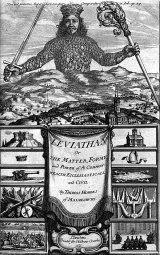Leviathan Page #3
Leviathan or The Matter, Forme and Power of a Common-Wealth Ecclesiasticall and Civil—commonly referred to as Leviathan—is a book written by Thomas Hobbes (1588–1679) and published in 1651 (revised Latin edition 1668). Its name derives from the biblical Leviathan. The work concerns the structure of society and legitimate government, and is regarded as one of the earliest and most influential examples of social contract theory.
And seeing dreames are caused by the distemper of some of the inward parts of the Body; divers distempers must needs cause different Dreams. And hence it is, that lying cold breedeth Dreams of Feare, and raiseth the thought and Image of some fearfull object (the motion from the brain to the inner parts, and from the inner parts to the Brain being reciprocall:) and that as Anger causeth heat in some parts of the Body, when we are awake; so when we sleep, the over heating of the same parts causeth Anger, and raiseth up in the brain the Imagination of an Enemy. In the same manner; as naturall kindness, when we are awake causeth desire; and desire makes heat in certain other parts of the body; so also, too much heat in those parts, while wee sleep, raiseth in the brain an imagination of some kindness shewn. In summe, our Dreams are the reverse of our waking Imaginations; The motion when we are awake, beginning at one end; and when we Dream, at another. Apparitions Or Visions The most difficult discerning of a mans Dream, from his waking thoughts, is then, when by some accident we observe not that we have slept: which is easie to happen to a man full of fearfull thoughts; and whose conscience is much troubled; and that sleepeth, without the circumstances, of going to bed, or putting off his clothes, as one that noddeth in a chayre. For he that taketh pains, and industriously layes himselfe to sleep, in case any uncouth and exorbitant fancy come unto him, cannot easily think it other than a Dream. We read of Marcus Brutes, (one that had his life given him by Julius Caesar, and was also his favorite, and notwithstanding murthered him,) how at Phillipi, the night before he gave battell to Augustus Caesar, he saw a fearfull apparition, which is commonly related by Historians as a Vision: but considering the circumstances, one may easily judge to have been but a short Dream. For sitting in his tent, pensive and troubled with the horrour of his rash act, it was not hard for him, slumbering in the cold, to dream of that which most affrighted him; which feare, as by degrees it made him wake; so also it must needs make the Apparition by degrees to vanish: And having no assurance that he slept, he could have no cause to think it a Dream, or any thing but a Vision. And this is no very rare Accident: for even they that be perfectly awake, if they be timorous, and supperstitious, possessed with fearfull tales, and alone in the dark, are subject to the like fancies, and believe they see spirits and dead mens Ghosts walking in Churchyards; whereas it is either their Fancy onely, or els the knavery of such persons, as make use of such superstitious feare, to pass disguised in the night, to places they would not be known to haunt. From this ignorance of how to distinguish Dreams, and other strong Fancies, from vision and Sense, did arise the greatest part of the Religion of the Gentiles in time past, that worshipped Satyres, Fawnes, nymphs, and the like; and now adayes the opinion than rude people have of Fayries, Ghosts, and Goblins; and of the power of Witches. For as for Witches, I think not that their witch craft is any reall power; but yet that they are justly punished, for the false beliefe they have, that they can do such mischiefe, joyned with their purpose to do it if they can; their trade being neerer to a new Religion, than to a Craft or Science. And for Fayries, and walking Ghosts, the opinion of them has I think been on purpose, either taught, or not confuted, to keep in credit the use of Exorcisme, of Crosses, of holy Water, and other such inventions of Ghostly men. Neverthelesse, there is no doubt, but God can make unnaturall Apparitions. But that he does it so often, as men need to feare such things, more than they feare the stay, or change, of the course of Nature, which he also can stay, and change, is no point of Christian faith. But evill men under pretext that God can do any thing, are so bold as to say any thing when it serves their turn, though they think it untrue; It is the part of a wise man, to believe them no further, than right reason makes that which they say, appear credible. If this superstitious fear of Spirits were taken away, and with it, Prognostiques from Dreams, false Prophecies, and many other things depending thereon, by which, crafty ambitious persons abuse the simple people, men would be much more fitted than they are for civill Obedience. And this ought to be the work of the Schooles; but they rather nourish such doctrine. For (not knowing what Imagination, or the Senses are), what they receive, they teach: some saying, that Imaginations rise of themselves, and have no cause: Others that they rise most commonly from the Will; and that Good thoughts are blown (inspired) into a man, by God; and evill thoughts by the Divell: or that Good thoughts are powred (infused) into a man, by God; and evill ones by the Divell. Some say the Senses receive the Species of things, and deliver them to the Common-sense; and the Common Sense delivers them over to the Fancy, and the Fancy to the Memory, and the Memory to the Judgement, like handing of things from one to another, with many words making nothing understood. Understanding The Imagination that is raysed in man (or any other creature indued with the faculty of imagining) by words, or other voluntary signes, is that we generally call Understanding; and is common to Man and Beast. For a dogge by custome will understand the call, or the rating of his Master; and so will many other Beasts. That Understanding which is peculiar to man, is the Understanding not onely his will; but his conceptions and thoughts, by the sequell and contexture of the names of things into Affirmations, Negations, and other formes of Speech: And of this kinde of Understanding I shall speak hereafter.
Translation
Translate and read this book in other languages:
Select another language:
- - Select -
- 简体中文 (Chinese - Simplified)
- 繁體中文 (Chinese - Traditional)
- Español (Spanish)
- Esperanto (Esperanto)
- 日本語 (Japanese)
- Português (Portuguese)
- Deutsch (German)
- العربية (Arabic)
- Français (French)
- Русский (Russian)
- ಕನ್ನಡ (Kannada)
- 한국어 (Korean)
- עברית (Hebrew)
- Gaeilge (Irish)
- Українська (Ukrainian)
- اردو (Urdu)
- Magyar (Hungarian)
- मानक हिन्दी (Hindi)
- Indonesia (Indonesian)
- Italiano (Italian)
- தமிழ் (Tamil)
- Türkçe (Turkish)
- తెలుగు (Telugu)
- ภาษาไทย (Thai)
- Tiếng Việt (Vietnamese)
- Čeština (Czech)
- Polski (Polish)
- Bahasa Indonesia (Indonesian)
- Românește (Romanian)
- Nederlands (Dutch)
- Ελληνικά (Greek)
- Latinum (Latin)
- Svenska (Swedish)
- Dansk (Danish)
- Suomi (Finnish)
- فارسی (Persian)
- ייִדיש (Yiddish)
- հայերեն (Armenian)
- Norsk (Norwegian)
- English (English)
Citation
Use the citation below to add this book to your bibliography:
Style:MLAChicagoAPA
"Leviathan Books." Literature.com. STANDS4 LLC, 2025. Web. 5 Feb. 2025. <https://www.literature.com/book/leviathan_192>.








Discuss this Leviathan book with the community:
Report Comment
We're doing our best to make sure our content is useful, accurate and safe.
If by any chance you spot an inappropriate comment while navigating through our website please use this form to let us know, and we'll take care of it shortly.
Attachment
You need to be logged in to favorite.
Log In